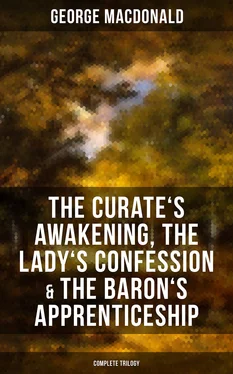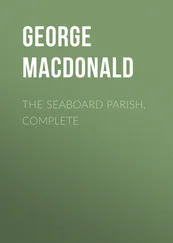"It were a more pertinent question, sir," returned Polwarth,—"If there be a God, how am I to find him?—And, as I hinted before, there is another question—one you have already put—more pertinent to your position as an English clergyman: Was there ever such a man as Jesus Christ?—Those, I think, were your own words: what do you mean by SUCH a man?"
"Such as he is represented in the New Testament."
"From that representation, what description would you give of him now? What is that SUCH? What sort of person, supposing the story true, would you take this Jesus, from that story, to have been?"
Wingfold thought for a while.
"I am a worse humbug than I fancied," he said. "I cannot tell what he was. My thoughts of him are so vague and indistinct that it would take me a long time to render myself able to answer your question."
"Perhaps longer still than you think, sir. It took me a very long time.—"
CHAPTER XVIII.
JOSEPH POLWARTH.
Table of Contents
"Shall I tell you," the gate-keeper went on, "something of my life, in return of the confidence you have honoured me with?"
"Nothing could be more to my mind," answered Wingfold. "And I trust," he added, "it is no unworthy curiosity that makes me anxious to understand how you have come to know so much."
"Indeed it is not that I know much," said the little man. "On the contrary I am the most ignorant person of my acquaintance. You would be astonished to discover what I don't know. But the thing is that I know what is worth knowing. Yet I get not a crumb more than my daily bread by it—I mean the bread by which the inner man lives. The man who gives himself to making money, will seldom fail of becoming a rich man; and it would be hard if a man who gave himself to find wherewithal to still the deepest cravings of his best self, should not be able to find that bread of life. I tried to make a little money by book-selling once: I failed—not to pay my debts, but to make the money; I could not go into it heartily, or give it thought enough, so it was all right I should not succeed; but what I did and do make my object, does not disappoint me.
"My ancestors, as my name indicates, were of and in Cornwall, where they held large property. Forgive the seeming boast—it is but fact, and can reflect little enough on one like me. Scorn and pain mingled with mighty hope is a grand prescription for weaning the heart from the judgments and aspirations of this world. Later ancestors were, not many generations ago, the proprietors of this very property of Osterfield, which the uncle of the present Lord de Barre bought, and to which I, their descendant, am gate-keeper. What with gambling, drinking, and worse, they deserved to lose it. The results of their lawlessness are ours: we are what and where you see us. With the inherited poison, the Father gave the antidote. Rachel, my child, am I not right when I say that you thank God with me for having THUS visited the iniquities of the fathers upon the children?"
"I do, uncle; you know I do—from the bottom of my heart," replied Rachel in a low tender voice.
A great solemnity came upon the spirit of Wingfold, and for a moment he felt as if he sat wrapt in a cloud of sacred marvel, beyond and around which lay a gulf of music too perfect to touch his sense. But presently Polwarth resumed:
"My father was in appearance a remarkably fine man, tall and stately. Of him I have little to say. If he did not do well, my grandfather must be censured first. He had a sister very like Rachel here. Poor Aunt Lottie! She was not so happy as my little one. My brothers were all fine men like himself, yet they all died young except my brother Robert. He too is dead now, thank God, and I trust he is in peace. I had almost begun to fear with himself that he would never die. And yet he was but fifty. He left me my Rachel with her twenty pounds a year. I have thirty of my own, and this cottage we have rent-free for attending to the gate. I shall tell you more about my brother some day. There are none of the family left now but myself and Rachel. God in his mercy is about to let it cease.
"I was sent to one of our smaller public schools—mainly, I believe, because I was an eyesore to my handsome father. There I made, I fancy, about as good a beginning as wretched health, and the miseries of a sensitive nature, ever conscious of exposure, without mother or home to hide its feebleness and deformity, would permit. For then first I felt myself an outcast. I was the butt of all the coarser-minded of my schoolfellows, and the kindness of some could but partially make up for it. On the other hand, I had no haunting and irritating sense of wrong, such as I believe not a few of my fellows in deformity feel—no burning indignation, or fierce impulse to retaliate on those who injured me, or on the society that scorned me. The isolation that belonged to my condition wrought indeed to the intensifying of my individuality, but that again intensified my consciousness of need more than of wrong, until the passion blossomed almost into assurance, and at length I sought even with agony the aid to which my wretchedness seemed to have a right. My longing was mainly for a refuge, for some corner into which I might creep, where I should be concealed and so at rest. The sole triumph I coveted over my persecutors was to know that they could not find me—that I had a friend stronger than they. It is no wonder I should not remember when I began to pray, and hope that God heard me. I used to fancy to myself that I lay in his hand and peeped through his fingers at my foes. That was at night, for my deformity brought me one blessed comfort—that I had no bedfellow. This I felt at first as both a sad deprivation and a painful rejection, but I learned to pray the sooner for the loneliness, and the heartier from the solitude which was as a chamber with closed door.
"I do not know what I might have taken to had I been made like other people, or what plans my mother cherished for me. But it soon became evident, as time passed and I grew no taller but more mis-shapen, that to bring me up to a profession would be but to render my deformity the more painful to myself. I spent, therefore, the first three years after I left school at home, keeping out of my father's way as much as possible, and cleaving fast to my mother. When she died, she left her little property between me and my brother. He had been brought up to my father's profession—that of an engineer. My father could not touch the principal of this money, but neither, while he lived, could we the interest. I hardly know how I lived for the next three or four years—it must have been almost on charity, I think. My father was never at home, and but for the old woman who had been our only attendant all my life, I think very likely I should have starved. I spent my time mostly in reading—whatever I could lay my hands upon—and that not carelessly, but with such reflection as I was capable of. One thing I may mention, as showing how I was still carried in the same direction as before—that, without any natural turn for handicraft, I constructed for myself a secret place of carpenter's work in a corner of the garret, small indeed, but big enough for a couch on which I could lie, and a table as long as the couch. That was all the furniture. The walls were lined from top to bottom with books, mostly gathered from those lying about the house. Cunningly was the entrance to this nest contrived: I doubt if anyone may have found it yet. If some imaginative, dreamy boy has come upon it, what a find it must have been to him! I could envy him the pleasure. There I always went to say my prayers and read my bible. But sometimes The Arabian Nights, or some other book of entrancing human invention, would come between, and make me neglect both, and then I would feel bad and forsaken;—for as yet I knew little of the heart to which I cried for shelter and warmth and defence.
Читать дальше












